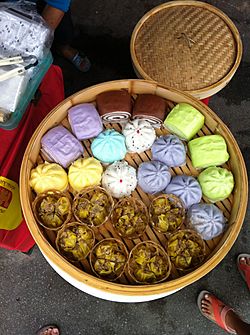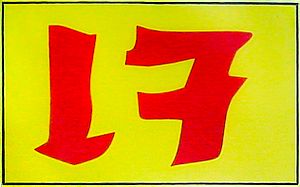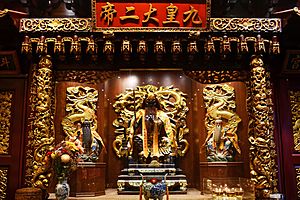Nine Emperor Gods Festival facts for kids
Quick facts for kids Nine Emperor Gods Festival |
|
|---|---|

During the Vegetarian Festival in Thailand, streets are filled with food stalls offering vegan Thai and Chinese food, e.g. buns and dim sums with mushrooms.
|
|
| Official name | Vegetarian Festival or Jay Festival |
| Observed by | Taoists |
| Significance | To commemorate to honour the gods on a large scale for nine days |
| Celebrations | Praying, eating pure vegan food |
| Observances | Offering food, burning joss paper, chanting of scriptures |
| Date | 1st night of the 9th lunar month |
The Nine Emperor Gods Festival is a big celebration for Taoists. It is also known as the Vegetarian Festival or Jay Festival. This festival lasts for nine days. It starts on the first evening of the ninth month in the Chinese calendar. People celebrate it mainly in Southeast Asian countries. These include Malaysia, Singapore, Indonesia, and Thailand.
In Thailand, people call this festival thetsakan kin che. This means "the Vegetarian Festival". It is celebrated all over Thailand. The biggest celebrations happen in Phuket. Many people there are Peranakans, a group with Chinese roots. The Phuket festival is very popular. It attracts many visitors because of its unique religious traditions. This festival happens at the same time as the Hindu festival Navaratri.
| Nine Emperor Gods Festival | |||||||||||||||
|---|---|---|---|---|---|---|---|---|---|---|---|---|---|---|---|
| Chinese name | |||||||||||||||
| Traditional Chinese | 九皇爺誕 | ||||||||||||||
|
|||||||||||||||
| Thai name | |||||||||||||||
| Thai | เทศกาลกินเจ | ||||||||||||||
| RTGS | Thetsakan Kinche | ||||||||||||||
| Malay name | |||||||||||||||
| Malay | Perayaan Sembilan Maharaja Dewa ڤراياءن سمبيلن مهاراج ديوا |
||||||||||||||
Contents
Celebrating in Thailand
Eating Vegan Food
During the Vegetarian Festival, you will see special red and yellow flags. These flags have the word "jay" (เจ) on them. Shops in Phuket and other parts of Thailand display these flags. They show that the shop is selling vegan food. This food is prepared for people who are taking part in the festival. Eating vegan food is seen as a way to become pure.
Food stalls sell many Thai and Chinese dishes. All these foods are made without any animal products. This means no meat, fish sauce, eggs, or dairy. They use plant-based ingredients instead. Sometimes, they even use realistic vegetarian "meats". The dishes are also made without strong spices like garlic or chili. You can find many kinds of tofu dishes during this time. Popular foods include pink noodle soup made with mushrooms. There are also fried tofu, spring rolls, and fried taro.
Keeping Pure
Besides eating pure food, people in the festival try to keep their thoughts pure. They also wear white clothes. White is a symbol of purity. This helps them feel clean inside and out.
Festival Locations
Phuket has the biggest festival. But many other cities in Thailand also celebrate.
Bangkok and Chiang Mai have many places selling vegan food. In 2023, even fancy restaurants offered special vegetarian menus. Hat Yai had over 100 vegetarian food stalls in 2022. Chinese temples in Hat Yai prepared lots of vegan food. They also hired more people for the festival. Many tourists from Malaysia visit Hat Yai for this event.
Nan also has many vegan food vendors. An American chef named Dan Sriprasert learned vegan recipes there. He used these recipes to create the menu for his popular restaurant in the United States.
Shopping malls in Thailand also join the festival. These include CentralWorld, Central Phuket, Central Pattana, and Central Hatyai.
Economic Impact
The Vegetarian Festival is very important for Thailand's economy. In 2023, it was expected to bring in about 44.6 billion baht. That's about 5.5% more than in 2022. It was the highest amount in 10 years. This shows how popular and important the festival is.
About the Nine Emperor Gods
The Nine Emperor Gods are very important gods in Taoism. They are believed to be the nine sons of a powerful Mother Goddess, Dou Mu Yuan Jun. She is said to control life and death. These gods are also known as Jiǔ Huáng Xīng Jūn or Jiǔ Huáng Da Di.
Taoist priests say that honoring these gods can help people live longer. It can also remove bad luck and forgive past mistakes. The word Ye (爺) in Jiu Huang Ye means "Grandfather." People use this to feel closer to the gods.
Some old stories say the Nine Emperor Gods were Ming dynasty fighters. But Taoist priests say this is not true. They explain that the Nine Emperor Gods are powerful Star Lords. They control the movement of planets. They also manage important life and death matters for people.
The Nine Emperors are actually formed by stars. Seven of them are the visible stars of the Big Dipper (Ursa Major). Two other stars are invisible to most people. These nine stars are:
- Tan Lang Tai Xing Jun (貪狼太星君) - 1st Star (Visible)
- Ju Men Yuan Xing Jun (巨門元星君) - 2nd Star (Visible)
- Lu Cun Zhen Xing Jun (祿存貞星君) - 3rd Star (Visible)
- Wen Qu Niu Xing Jun (文曲紐星君) - 4th Star (Visible)
- Lian Zhen Gang Xing Jun (玉廉貞綱星君) - 5th Star (Visible)
- Wu Qu Ji Xing Jun (武曲紀星君) - 6th Star (Visible)
- Po Jun Guan Xing Jun (破軍關 Xing Jun) - 7th Star (Visible)
- Zuo Fu Da Dao Xing Jun (左輔大道星君) - 8th Star (Invisible)
- You Bi Da Dao Xing Jun (右弼大道星君) - 9th Star (Invisible)
Festival Traditions
On the evening before the ninth lunar month, temples hold a special ceremony. They welcome the Nine Emperor Gods. People believe the gods arrive through waterways. So, parades go from temples to the sea or a river. This shows the gods' arrival. People wear white clothes and carry incense and candles. They wait for the gods to come.
The temple areas become very lively during the nine days. It feels like a carnival. You can hear prayer bells ringing and priests chanting. Many people stay at the temple. They eat vegetarian meals and avoid certain activities. They also keep chanting prayers. It is believed that it will rain throughout the nine days of the festival.
The ninth day is the most important day. A huge parade takes place. Thousands of people join to send the Nine Emperor Gods back. This also happens by the waterways.
Images for kids
See also
- Doumu (斗母元君)
- Tou Mu Kung Temple, Singapore
- Chinese folk religion in Southeast Asia
- Wang Ye worship
- Birthday of the Monkey God
- Monkey King Festival
- Zhong Yuan Festival
- List of vegetarian festivals
 | Aurelia Browder |
 | Nannie Helen Burroughs |
 | Michelle Alexander |












